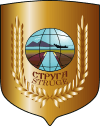Radolišta
Radolišta (Macedonian: Радолишта, Albanian: Ladorisht) is a village in the municipality of Struga, North Macedonia.
Radolišta Радолишта Ladorisht | |
|---|---|
Village | |
 View of the lower part of town. In the background, Lake Ohrid and Galičica mountains with Struga toward the left side and Kališta village toward the right | |
 Radolišta Location within North Macedonia | |
| Coordinates: 41°9′51″N 20°37′23″E | |
| Country | |
| Region | |
| Municipality | |
| Elevation | 745 m (2,444 ft) |
| Population (2002) | |
| • Total | 3,119 |
| Time zone | UTC+1 (CET) |
| • Summer (DST) | UTC+2 (CEST) |
| Postal code | 6333 |
| Area code(s) | +389 |
| Car plates | SU |
| Website | . |
Geography
This village is located in the southwest of Struga Municipality, at the foot of the Jablanica mountain range. The village is in hilly-mountain altitude of 700–820 m (2,297–2,690 ft) above sea level.
History
Human settlement in Radolišta has a long history that dates back to late antiquity:
- - Traces of old structural foundations located in the eastern part of the village
- - Paleochristian Basilica (locally called "Bazilika") - built in the 6th century[1]
- - Necropolis (7th-8th centuries)
Demographics
The village of Radolišta is inhabited by Tosks, a subgroup of southern Albanians and speak the Tosk Albanian dialect.[2][3] Radolišta is one of the largest villages in the region of Struga with more than 800 houses and the population adheres to Islam.
According to the 2002 census, the village had a total of 3119 inhabitants.[4] Ethnic groups in the village include:[4]
- Albanians 3085
- Macedonians 1
- Turks 1
- Serbs 1
- Others 32
Culture
In village cultural life is organized and sports activities through the football club 'Flamurtari (progress) and SHKA Valët e Liqenit (Lake waves) are represented in as many festivals as well as being honoured with the outside of many awards and praise. Radolišta also are rooted in cultural heritage as Ura e gurit OPALE (Stone bridge OPALE).
Sports
The local football club KF Flamurtari Ladorisht plays in the Macedonian Third Football League.
Gallery
 Village centre and square
Village centre and square Houses of Radolišta
Houses of Radolišta View from Radolišta looking out toward Struga (far background)
View from Radolišta looking out toward Struga (far background) Radolišta and Lake Ohrid (background)
Radolišta and Lake Ohrid (background) Radolišta, its mosque and nearby fields
Radolišta, its mosque and nearby fields- Floor mosaic of Christian basilica (6th century)
References
- Palairet, Michael (2016). Macedonia: A Voyage through History (Vol. 1, From Ancient Times to the Ottoman Invasions). Cambridge: Cambridge Scholars Publishing. p. 152. ISBN 9781443888431.CS1 maint: ref=harv (link)
- Murtishi, Kaim (2001). Ladorishti: Histori dhe Tradita. Asdreni. p. 53.CS1 maint: ref=harv (link) "Ladorishti, Frëngova, Zagraçani dhe Kalishti fshatra toske"
- Tuda, Shpresa (1977). "Të dhëna për zakonet e vdekjes dhe vajtimet në Strugë dhe rrethinë". Gjurmime albanologjike: Folklor dhe etnologji. 5–7: 159.CS1 maint: ref=harv (link) "Fshatrat e rrethinës së Strugës siç janë: Kalishti, Frengova, Ladorishti, Zagraçani dhe Shumi flasin në dialektin toskë, kurse në të gjithë fshatrat e tjerë flitet gegënishtja.".
- Macedonian Census (2002), Book 5 - Total population according to the Ethnic Affiliation, Mother Tongue and Religion, The State Statistical Office, Skopje, 2002, p. 182.
